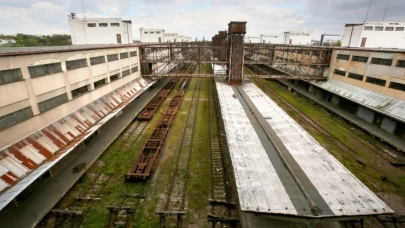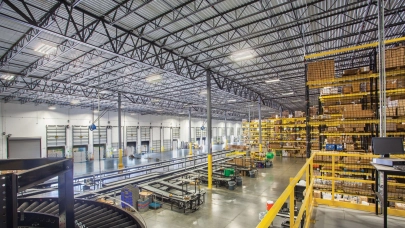
Amid technological advances, growing client demands, legal regulations and the need to urgently respond to economic developments, the commercial real estate market is increasingly being influenced by AI-based solutions. According to the latest report from BNP Paribas Real Estate Poland, sophisticated technological solutions are becoming - and will continue to be - key at all stages, from project planning and construction to tenant screening, property and energy management, and even investment.
Among the many trends in commercial real estate, AI-powered proptech solutions are set to completely revolutionise the sector in the coming years. Proptech - short for property technology - refers to IT technologies and techniques used throughout all the stages of a real estate lifecycle. It focuses on transforming traditional business models and enhancing the quality and efficiency of existing processes. In 2022, the global proptech market was valued at $30.16 billion and is projected to grow by up to 16% annually from 2023 to 2032.
There is a vast array of AI-based solutions for commercial real estate, according to the authors of AI in Commercial Real Estate, the latest report from BNP Paribas Real Estate Poland. These solutions are already in use in the office sector. “In my opinion, the office market will be one of the key beneficiaries of AI development”, says Adam Jakubowski, Operations Director, Property Management, BNP Paribas Real Estate Poland.
Trend forecasting and property management
The commercial real estate market has a multidimensional structure. Land acquisition, construction, building management, leasing and disposal are merely a façade behind a range of processes essential for the efficient functioning of this market. Even before committing to an investment, it is important to carry out market and financial analyses. AI-based solutions will assist in predicting market trends, identifying potential investment opportunities and estimating demand for specific types of commercial properties.
AI will also streamline operational processes in property management. It will assist with facility management by monitoring building systems and individual components in real time. Additionally, AI will predict maintenance needs, improve energy efficiency and building safety, redefine office spaces and enhance the tenant experience.
“AI-powered systems also enable collecting and analysing user preferences regarding temperature, lighting and other workplace conditions. These systems monitor air quality, background noise levels and other environmental factors to ensure an optimal work environment. For instance, they can automatically control ventilation or activate air filtration systems whenever pollutants are detected. AI-enabled technology can also optimise maintenance schedules, minimise system downtime and maximise system availability”, explains Adam Jakubowski.
There is an increasing number of such solutions available on the market. In the US, Kastle Systems provides real office user occupancy data, while the UK-based company HoxtonAI helps retail property owners and managers collect and analyse shopping centre footfall data. In Poland, REDD collects and processes commercial real estate data for AI-based predictive systems. AI is also powered by data captured by modern sensors in advanced building management systems (BMS).
AI brings tangible benefits to the wallet and the planet
According to the authors of the report by BNP Paribas Real Estate Poland, AI solutions will yield the greatest benefits in energy management. Some systems are already in place that monitor, analyse and optimise energy use in buildings. Data collection also leads to environmental benefits. In 2016, Google’s DeepMind used advanced algorithms to design a system that allowed the California-based giant to reduce the amount of energy used by its data centres by 40%. At the beginning of this year, BrainBox AI developed its Artificial Responsive Intelligent Assistant (ARIA), which makes necessary real-time adjustments to reduce energy consumption. The company claims that optimising building operations management can reduce energy costs and carbon emissions by 25% and 40% respectively.
AI can also help with non-financial reporting, as required by the CSRD. A significant challenge lies in developing a model for collecting and verifying data, as well as structuring and auditing ESG reports. The quality and validity of environmental data will heavily depend on the implementation of partially AI-based systems.
AI in Warsaw
In the real estate market, AI is no longer just a buzzword but an increasingly tangible reality. BNP Paribas Real Estate Poland is likely the first company in the Polish commercial property market to have developed a predictive model for forecasting office absorption and vacancy rates, powered by intelligent machine learning algorithms. Another pioneer in this field is the office developer Ghelamco, which integrates AI into a property’s lifecycle from the early stages of a new development. A noteworthy example is the AI-driven system deployed at The Bridge, an office project under construction in Grzybowska Street in Warsaw. The system uses an industrial robot to drill holes and install multiple mounting elements in lift shafts – a task that demands high precision.
“New AI-based solutions are currently being tested at Warsaw UNIT for broader facility management through the Building Management System (BMS). We remain cautious about these tests, prioritising the safety and comfort of building users. We are, however, optimistic about the potential to optimise carbon emissions and service charges, which will translate into tangible savings for tenants while significantly reducing our environmental impact. Looking ahead, we are planning to deploy similar solutions at The Bridge”, says Jarosław Fiutowski, Deputy Technical Director, Ghelamco.
The company also uses sophisticated surveillance and facial recognition systems to prevent unauthorised access by monitoring the perimeter fence of the construction site and, if necessary, alerting relevant services. The Bridge will also be equipped with CCTV cameras and AI-powered systems capable of detecting items left in common areas, such as packages, that could pose a potential terrorist threat.



